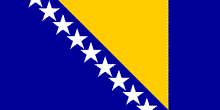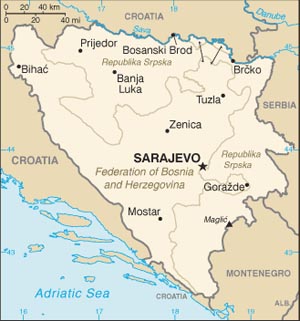Bosnia and Herzegovina
 Flag of Bosnia and Herzegovina | |
| Capital | Sarajevo |
| Inhabitants | 4.621.598 |
| Language(s) | Bosnian, Serbain and Croatian |
Bosnia and Herzegovina's declaration of sovereignty in October 1991, was followed by a referendum for independence from the former Yugoslavia in February 1992. The Bosnian Serbs - supported by neighboring Serbia - responded with armed resistance aimed at partitioning the republic along ethnic lines and joining Serb-held areas to form a "greater Serbia." In March 1994, Bosniaks and Croats reduced the number of warring factions from three to two by signing an agreement creating a joint Bosniak/Croat Federation of Bosnia and Herzegovina. On 21 November 1995, in Dayton, Ohio, the warring parties signed a peace agreement that brought to a halt the three years of interethnic civil strife (the final agreement was signed in Paris on 14 December 1995). The Dayton Agreement retained Bosnia and Herzegovina's international boundaries and created a joint multi-ethnic and democratic government. This national government is charged with conducting foreign, economic, and fiscal policy. Also recognized was a second tier of government comprised of two entities roughly equal in size: the Bosniak/Croat Federation of Bosnia and Herzegovina and the Bosnian Serb-led Republika Srpska (RS). The Federation and RS governments are charged with overseeing internal functions. In 1995-96, a NATO-led international peacekeeping force (IFOR) of 60,000 troops served in Bosnia to implement and monitor the military aspects of the agreement. IFOR was succeeded by a smaller, NATO-led Stabilization Force (SFOR) whose mission is to deter renewed hostilities. SFOR remains in place at a level of approximately 21,000 troops.
Contents |
History
- 6th/7th century: Immigration of Slavs to the Bosnia and Herzegovina region
- 1180: Bosnian principality under Ban Kulin. He tolerates the religious movement of the Bogomils, who are persecuted as a heretical movement in other areas of the western Balkans
- 1353-1391: The Bosnian principality flourishes under King Tvrtko I
- 1463: The majority of Bosnia under Turkish rule; conversion of Bogomil sections of the population to the Islam
- 1481: Herzegovina under Turkish rule
- 1580: Reunification of Bosnia and Herzegovina as a ‘pashaluk’
around 1700 Stabilization of the borders between the Ottoman Empire (‘Bosnian Pashaluk’) and the Habsburg monarchy
- 1839: Dissolution of the self-administration of Bosnia after anti-Turkish revolts by the feudal Islamic upper strata
- 1878: Austro-Hungarian occupation of Bosnia following the Berlin Congress
- 1908: Annexation of Bosnia-Herzegovina by Austria-Hungary
- 1912/13: Balkan wars: Serbia makes a futile attempt to establish itself more firmly in B+H
- 28 June 1914: Assassination of the Austro-Hungarian heir to the throne and his wife by the Serbian nationalist Gavrilo Princip in Sarajevo
- 1918: Bosnia-Herzegovina becomes part of the new kingdom of the Serbs, Croats and Slovenians
- 1929: Proclamation of the ‘Kingdom of Yugoslavia’; dictatorship of King Alexander
- 1939: ‘Sporazum’: Serbs and Croats agree on the division of B+H into Serb and Croat-dominated Banovinas (Cvetkovic-Macek)
- 1941: German and Italian troops occupy Yugoslavia; B+H is integrated into the fascist ‘Independent State of Croatia’
- 25 November 1943: Constitution of the ‘People’s Republic of Bosnia-Herzegovina’ (NRBiH)
- 29 November 1943: Proclamation of the ‘Federal People’s Republic of Yugoslavia’ (FNRJ)
- 1963: New Bosnian constitution: Muslims recognized as a ‘people’ of Bosnia for the first time
- 1971: National census: Muslims can officially register for the first time as ‘Muslims in the sense of a nation’ (approx. 800,000 do so)
- 1974: New constitutions of the Federation (Socialist Federal Republic of Yugoslavia) and of the republics: strong tendency towards decentralization
- 1980: Death of Tito
- Summer 1991: Collapse of Yugoslavia
- 1 March 1992: Referendum: majority of Bosnian Muslims and Croats in favour of independence, most Serbs boycott the voting; as a result, first the Bosnian Serbs, and then, a year later, also the Bosnian Croats (in Herzegovina) attempted to take control of as large areas of land as possible, in order to finally annex them to their respective ‘mother country’ (ca. 278,000 dead and missing persons, 1.325 million refugees and exiles)
- 6 April 1992: Recognition of the Republic of Bosnia and Herzegovina by US and EU member states
- 18 March 1994: In Washington, Bosnians and Croats sign the treaty to form a ‘Federation of Bosnia-Herzegovina
- 14 December 1995: Signing of the Dayton Accords in Paris: unified and politically independent state of Bosnia and Herzegovina (BiH), consisting of the Federation of BiH (FBiH) and Republika Srpska (RS); full responsibility for the political and civil implementation of the Peace Accords is in the hands of the High Representative (Bildt, Westendorp, since July 1999: Petritsch). The latter receives political directives from the steering committee of the Peace Implementation Council (PIC), including representatives of the G8 states, the EU presidency, the EU Commission and Turkey (for the Organization of the Islamic Conference). The High Representative reports to the UN Security Council. Separation of the factions at war and the stabilization of the security situation were guaranteed under the leadership of NATO from the end of 1995 onwards, first by IFOR, and then, from the end of 1996, by the stabilization force SFOR
Culture
Historically, Bosnians were a pretty tolerant lot, their land peopled with practitioners of Islam, Eastern Orthodoxy, Catholicism, Protestantism, Judaism and a host of other religions and ideologies. Their art and architecture reflected this diversity, as did their cuisine. This brotherly acceptance ground to a bloody halt with the brutal bouts of 'ethnic cleansing' during the war. In the post-war period, memories of the atrocities committed by all sides remain fresh, and that spirit of tolerance has gone the way of the many mosques, synagogues and other symbols of divergent faiths that were torched and shelled during the fighting.
Religion
Religious conflict is one of the unavoidable facts about this devastated country. Despite wishful thinking about a renewed tolerance and integration, the Serb Republic is almost entirely Christian and the Federation is almost entirely Muslim. In each part of Bosnia-Hercegovina, churches and mosques are being rebuilt at lightning speeds, but this phenomenon has more to do with nationalism than religion, since most people are fairly secular. Ironically, Serbs, Croats and Bosnian Muslims are all South Slavs of the same ethnic stock. Physically, they are indistinguishable.
Language
Dialects notwithstanding, the people of Bosnia-Hercegovina speak the same language, though that language is called 'Bosnian' in the Muslim part of the Federation, 'Croatian' in Croat-controlled parts and 'Serbian' in the Republika Srpska. The Federation uses Latin script, while the Serbs use Cyrillic. There are over 30 letters in the alphabet, many of them pronounced as they are in English. Bosnia takes its name from the Bosna River that runs through it, Hercegovina from the herceg (duke) who ruled the southern portion of the region until the 15th-century Turkish conquest.
Daily Tips
Removing one's shoes is customary in Muslim households; the host family will provide slippers. In general, the Bosnian people are incredibly friendly toward visitors, but when conversation turns to politics, your best strategy is to listen. People are eager to talk about the war but are generally convinced that their side is right.
Food
The country's Eastern background is evident in its cuisine of grilled meats, bosanski lonac (a stew of cabbage and meat), baklava (a Turkish sweet) and the ubiquitous servings of burek and pida (layered cheese or meat pies). Vegetarians have fewer choices, but there's always sirnica (cheese pie) or zeljanica (spinach pie). Tufahije is an apple cake topped with walnuts and whipped cream.
Literature
Bosnia's best known author is Ivo Andric, the Nobel prize-winning author of Bridge over the Drina, the first of a trilogy of historical novels. Another thing the country's famous for, it may surprise you to learn, is basketball, Bosnia's most popular sport. What may surprise you further, in case you hadn't heard, is that their players are really good.
Events
coming soon...
National holidays
- Jan 1: New Year (Western Christians)
- Jan 7: Christmas Day (Orthodox)
- Jan 14: New Year (Orthodox)
- Mar 1: Independence Day
- May 1: Labour Day
- May 6: St George's Day (Orthodox)*
- Jun 28: Vidovdan (Orthodox)*
- Jul 12: Petrovdan (Orthodox)*
- Aug 2: Ilindan (Orthodox)*
- Aug 15: Velika gospa - Assumption (Western Christians)
- Aug 28: Velika gospojina - Assumption (Orthodox)
- Sep 8: Mala gospa - Nativity of the Virgin Mary (Western Christian)
- Sep 21: Mala gospojina - Nativity of the Virgin Mary (Orthodox)
- Nov 1: All Saints' Day (Western Christians)
- Nov 2: All Souls Day (Western Christians)
- Nov 8: Mitrovdan (Orthodox)*
- Nov 25: National Day
- Dec 25: Christmas Day (Western Christians)
Embassies
- Embassy of Belgium in Sarajevo, Bosnia and Herzegovina -- 4, Abdesthana, 71000 Sarajevo Tel: 233.772, 233.773 Fax: 233.774
- Embassy of Canada in Sarajevo, Bosnia and Herzegovina -- Logavina 7, 71 000 Sarajevo, Bosnia and Herzegovina Tel: 447900 Fax: 447901 E-mail: sjevo@dfait-maeci.gc.ca
- Embassy of the People´s Republic of China in Bosnia and Herzegovina -- Pavla Lukaca 16B, 71000, Sarajevo Tel: 654666 Fax: 652972
- Royal Danish Embassy in Sarajevo, Bosnia and Herzegovina -- Skenderija 4, 71000 Sarajevo, Bosnia & Herzegovina. (Source from Udenrigsministeriet, check following URL for update information) Tel: (71) 665901, 665651 Fax: (71) 665902 E-mail: danamb@bih.net.ba
- Embassy of France in Sarajevo, Bosnia and Herzegovina -- 18 Ulica Mehmed Bega Kapetanovica Ljubusaka 71000 Sarajevo Tel: 668 149 (ou 51) Fax: 668 103
- Embassy of France in Bosnia Herzegovina
- [http://www.angelfire.com/nh/saint/ Embassy of Malaysia in Sarajevo, Bosnia Herzegovina
- Embassy of Norway in Sarajevo, Bosnia Herzegovina
- Embassy of the United States of America in Sarajevo, Bosnia Herzegovina
- Consulate General of the United States of America in Bosnia Herzegovina -- embassy: Alipasina 43, 71000 Sarajevo mailing address: use street address telephone: [387] (71) 445-700 Fax: [387] (71) 659-722
- United Nations High Commissioner for Refugees in Bosnia Herzegovina -- UNHCR Office of the chief of mission in Bosnia and Herzegovina.
